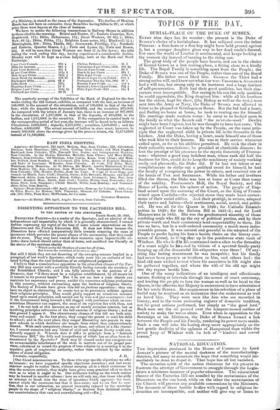TOPICS OF THE DAY.
BURIAL-PLACE OF THE DUKE OF SUSSEX. EVERY nine days has its wonder : the present is the Duke of SUSSEX'S choice of a burial.place. It has eclipsed even the infant Princess : a first-born or a first boy might have held ground against it, but a younger daughter gives way to her dead uncle's funeral. For once the world of London is sentimental, and keeps looking at the western sky instead of turning to the rising sun.
The great body of the people have hearts, and see in the choice of Kensal Green as a last resting-place, a fitting close to a kindly life. The Royal Family is something apart from the People ; the
Duke of SUSSEX was one of the People, rather than one of the Royal Family. His father never liked him. GEORGE the Third had a strong active will, and knew not what fear was: FREDEnicz.AuGosTus had a will too, but strong only in its inertness and a large instinct of self-preservation. Both had their good qualities, but their cha- racters were incompatible. Not seeing in his son the only qualities
he could appreciate, the King despised him : while all his brothers but the oldest, kept for show, (the Bishop as well as the rest,) were
sent into the Army or Navy, the Duke of SUSSEX was allowed to
loiter as he pleased at Gottingen or Rome. But the lad had a heart, and finding no home at home, he took to rearing one for himself.
His marriage made matters worse : he came to be looked upon in the family as what the Scotch call " the ne'er-do-weel." Devilry might have been forgiven, but be was thought to have lost caste. The neglected at Court was taken up by the People, on the same prin- ciple that the neglected child in private life is the favourite in the kitchen. And the Duke, having a heart, made himself one of those who took him to their bosoms. He was at their service whenever called upon, as far as his abilities permitted. He took the chair in their scientific associations ; he presided at charitable dinners ; he lent the prestige of his presence to the mystic fraternity of Freema- sons : whatever a good easy indolent mac, whose rank did half the business for him, could do to keep the machinery of society working easily and pleasantly, the Duke did. If he had not talent or ac- complishments to strike out a political creed for himself, he had the faculty of recognizing the power in others, and received one at the hands of Fox and SHERIDAN. While his father and brothers filled the throne, the Duke was less at home at Court than many of the nobility. Freemason's Hall, the Royal Society, and the House of Lords, were his sphere of action. The people of Eng- land seized upon the castaway of the Court, as the King of France seized upon Cordelia—the rejected stone they made head-corner- stone of their social edifice. And their protége, in return, adopted their tastes and habits—their sentiments, social, moral, and politi- cal. He was all for the Queen in 1820; for Catholic Emanci- pation in 1829 ; for the Reform Bill in 1831-2 ; and for Lord MELBOURNE in 1835. His was the goodnatured sincerity of those confiding souls who fill up the cry of political parties, and by their private worth and their consistency lend respectability to them. He was no hero, but in a well-ordered community a much more indis- pensable person. It was natural and graceful in the adopted of the People to prefer laying his bones beside theirs on the breezy emi- nence of Kensal, to being shut up in the ponderous state vault of Windsor. He who hr din life contracted tastes alien to the formality of a court might be haunted by visions of a spectral family-party keeping up all the distasteful life-etiquettes even there ! Of any- thing like lasting resentment he was incapable ; but his family had never been parents or brothers to him, and others had : the kind old man wished to rest where his associates in life might also be gathered together, and where the wife of his old age might one day repose beside him.
One of the many indications of an intelligent and affectionate nature, flashing at intervals through the screen of, court ceremony, and leading the people to love the woman as well as be loyal to the Queen, is the affection her Majesty is understood to have entertained for her uncle SUSSEX. Her acquiesence in his selection of a place of burial may be received as an indication that she understood as well as loved him. They were men like him who are recorded in history, and in the more endearing register of domestic tradition, not for great actions performed, but simply as "the good lord." Such men are the oil poured over the tempest-tossed surface of society to make the waves abate. Even when in opposition to the Sovereign or his Ministers, the Duke of SUSSEX formed a link between the People and his Family, rendering its power more stable. Such a one will take his lasting sleep more appropriately on the last gentle declivity of the uplands of Hampstead than within the proud keep of Windsor with its belt of " kindred and coeval towers."


























 Previous page
Previous page